
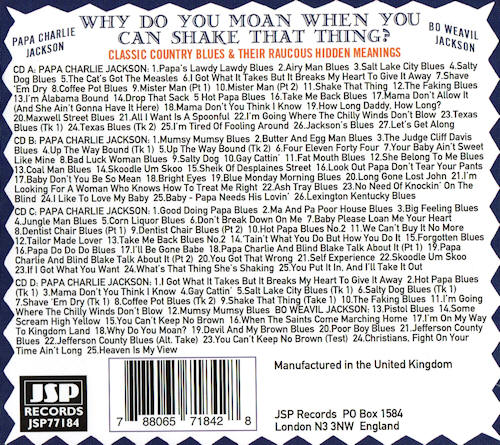
This is the full essay (click
on the links below) published in short form as the liner notes for 'Why Do You Moan, When You Can Shake That Thing?'
the JSP Records 4 CD boxed set. We hope you all
enjoy it.
Essay © Copyright 2014 Max Haymes. All rights reserved.
Website, page design and formatting
© Copyright 2000-2015 Alan White. All Rights Reserved.
www.jsprecords.com
www.redlick.com
___________________________________________________________________________________________________________________
One of the
interesting facts to emerge from putting Papa Charlie Jackson and Bo
Weavil Jackson together in a CD set, is the obvious different
approaches they applied to the recently-arrived phenomenon - the
country or rural blues. Both artists were growing up in the South
when the Blues were relatively young. Still, there would seem to be
little commonality between William Henry and James Jackson - presumed
to be their respective given names. Apart from sharing a (very
common) surname and both coming from an earlier generation of
singers, of the 19th. Century. A further instance may be
cited insofar they both accompanied themselves on stringed
instruments. Papa Charlie, in the words of Chris Smith
“generally played the banjo-guitar, a hybrid instrument whose six
strings were tuned and fingered like a guitar’s, but whose banjo
body gave it a light, staccato sound.”. (1)
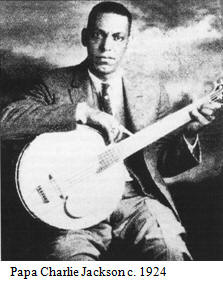 Chris
Smith attributes a birthdate for Papa Charlie Jackson as “c.
1885”. (2) But up to the
present time (26th. January 2014) no one has hazarded
even an approximate year for the initial appearance on the planet of
Bo Weavil Jackson. Judging by some of his recorded repertoire and
along with a solitary ‘head-shot’ picture, he would appear to be
possibly a good ten years older than Charlie. This would make him a
cotemporary of Henry Thomas (b.1874) and a date in the 1870s - maybe
at the beginning of the decade, is my educated guess. Unlike many
early blues singers, Papa Charlie Jackson came from a city - New
Orleans - or an otherwise large urban environment. This is reflected
in his recordings and their musical influences. His affinity with
early vaudeville blues singers
[Footnote
1: See my 4-CD set Vaudeville Blues (Blues Links-Vaudeville &
Rural Blues: 1919-1941) on JSP 77161, issued 2012.]
would seem to
support this. He appeared on 7 sides with Ida Cox, Ma Rainey and
Hattie McDaniel in 1925, 1928 and 1929, respectively. Cutting 74
sides under his own name between 1924 and 1934, only 4 remain
unissued. Together with three with Ida Cox, two with Ma Rainey, and
probably two with Hattie McDaniel, making 81 in total.
Chris
Smith attributes a birthdate for Papa Charlie Jackson as “c.
1885”. (2) But up to the
present time (26th. January 2014) no one has hazarded
even an approximate year for the initial appearance on the planet of
Bo Weavil Jackson. Judging by some of his recorded repertoire and
along with a solitary ‘head-shot’ picture, he would appear to be
possibly a good ten years older than Charlie. This would make him a
cotemporary of Henry Thomas (b.1874) and a date in the 1870s - maybe
at the beginning of the decade, is my educated guess. Unlike many
early blues singers, Papa Charlie Jackson came from a city - New
Orleans - or an otherwise large urban environment. This is reflected
in his recordings and their musical influences. His affinity with
early vaudeville blues singers
[Footnote
1: See my 4-CD set Vaudeville Blues (Blues Links-Vaudeville &
Rural Blues: 1919-1941) on JSP 77161, issued 2012.]
would seem to
support this. He appeared on 7 sides with Ida Cox, Ma Rainey and
Hattie McDaniel in 1925, 1928 and 1929, respectively. Cutting 74
sides under his own name between 1924 and 1934, only 4 remain
unissued. Together with three with Ida Cox, two with Ma Rainey, and
probably two with Hattie McDaniel, making 81 in total.
Two of the most popular
sides Papa Charlie cut were Salty Dog Blues [Paramount 12236]
and Shake That Thing [Paramount 12281] in 1924 and 1925
respectively. He became one of the very few blues artists in the
pre-war era who recorded with jazz players. In 1926 he did a re-make
of Salty Dog Blues [Paramount 12399] accompanied by Freddie
Keppard And His Jazz Cardinals - significantly (?) Jackson did not
play his banjo on this version. Also recorded by several blues
singers including the most memorable by Clara Smith and later Kokomo
Arnold. While Shake That Thing was covered by Ethel Waters
who unsuccessfully tried to claim the song as her own, as well as
versions including Kokomo Arnold, Viola McCoy and Eva Taylor. Papa
Charlie, like several others from an earlier generation of blues
singers like Charlie Patton and Blind Lemon Jefferson, also cut four
excellent gospel sides. Three with some of the finest bottleneck
guitar on record (as on some of his blues) and one played in
‘standard’ or with the ‘naked fingers’ as some pundit once described
it. This latter song I’m On My Way To The Kingdom Land
[Paramount 12390] includes some heavy percussion or ‘stomping his
box’ which may be seen as a precursor of style used by the great
Blind Willie Johnson within a couple of years, on his Let Your
Light Shine On Me in 1929. Or ultimately from master Delta
blues man Charlie Patton himself. Indeed, Don Kent says of his
Devil And My Brown Blues [Vocalion unissued] it is
“imaginative in utilizing different melodies and guitar parts (much
like Charlie Patton), rather than repeating the same riffs
throughout the song with minor or no embellishments.”. (3)
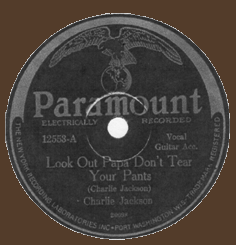 Although
both Jacksons remain shadowy figures, in the case of Papa Charlie
this became slightly less so on the publication of an excellent
article by Paul Swinton in The Frog Blues & Jazz Annual No.2.
It is from this article we learn that Papa Charlie Jackson was “A
neighbour and sometimes playing partner” (4)
of another vaudeville blues singer, Laura Rucker. Although they
never recorded together, as far as we know. But by approaching the
subject with some caution, the odd little biographical snippet may
be gleaned from some of his recordings. For example on Look out
Papa, Don’t Tear Your Pants [Paramount 12553] Jackson reveals he
was the first-born in his family, implying of course the existence
of at least one male sibling. He plays his usual banjo accompaniment
and NOT guitar. B.&G.R. to be adjusted accordingly.
Although
both Jacksons remain shadowy figures, in the case of Papa Charlie
this became slightly less so on the publication of an excellent
article by Paul Swinton in The Frog Blues & Jazz Annual No.2.
It is from this article we learn that Papa Charlie Jackson was “A
neighbour and sometimes playing partner” (4)
of another vaudeville blues singer, Laura Rucker. Although they
never recorded together, as far as we know. But by approaching the
subject with some caution, the odd little biographical snippet may
be gleaned from some of his recordings. For example on Look out
Papa, Don’t Tear Your Pants [Paramount 12553] Jackson reveals he
was the first-born in his family, implying of course the existence
of at least one male sibling. He plays his usual banjo accompaniment
and NOT guitar. B.&G.R. to be adjusted accordingly.
|
scat vocal |
|
|
Spoken: |
Yessir! My pappy’s an old
man. Crazy about young girls. By me bein’ the eldest
son, That made me be crazy [about them] too. Now, I’m gonna tell you all
about my pappy getting’ over that fence. |
|
Vocal: |
Look out, pappy gonna tear your pants; [trousers
in UK]
I wants you to understand.
An old man can’t get over that fence.
Oh! Daddy, don’t tear your pants. |
|
Refrain: |
A-gosh papa, don’t you tear your pants;
I want you to fairly understand.
You know you had a needle an’ you had some thread;
An’ you oughta done sewed them
pants. (5) |
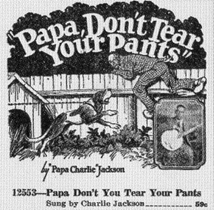 This
is the earliest version on record and in the following decade others
appeared titled Don’t Tear My Clothes. Six to be precise, of
which the Library of Congress side by Willie George Albertine King
(1940) and the Red Nelson Don’t Tear My Clothes No.3 remain
unissued. The version by Billy and Mary Mack is unheard by me.
None of the three recordings I do have include the opening
patter (not surprisingly) of Jackson’s song, or indeed the whole
theme of his song. Basically, an old man visiting a married woman
at her home and being surprised by the return of an angry husband,
makes a break for it across the back yard - tearing his clothes in
his frantic haste. Although Big Bill Broonzy (see JSP 7718, 7750
& 7767) on the State Street Boys 1935 recording - and the first ‘cover’
of the Jackson song - does close with a verse concerning himself and
his ‘buddy’ fighting over another man’s wife which could easily lead
to an incident of fence-leaping to escape! But Bill omitted this
verse some two years later when he re-recorded the song with the
Chicago Black Swans in 1937. This slavishly followed a 1936 disc by
Washboard Sam. So Charlie’s reference to being ‘the eldest son’ is
almost certain to be a fact of his life. From which of course we
can say there was at least another male sibling in his immediate
family.
This
is the earliest version on record and in the following decade others
appeared titled Don’t Tear My Clothes. Six to be precise, of
which the Library of Congress side by Willie George Albertine King
(1940) and the Red Nelson Don’t Tear My Clothes No.3 remain
unissued. The version by Billy and Mary Mack is unheard by me.
None of the three recordings I do have include the opening
patter (not surprisingly) of Jackson’s song, or indeed the whole
theme of his song. Basically, an old man visiting a married woman
at her home and being surprised by the return of an angry husband,
makes a break for it across the back yard - tearing his clothes in
his frantic haste. Although Big Bill Broonzy (see JSP 7718, 7750
& 7767) on the State Street Boys 1935 recording - and the first ‘cover’
of the Jackson song - does close with a verse concerning himself and
his ‘buddy’ fighting over another man’s wife which could easily lead
to an incident of fence-leaping to escape! But Bill omitted this
verse some two years later when he re-recorded the song with the
Chicago Black Swans in 1937. This slavishly followed a 1936 disc by
Washboard Sam. So Charlie’s reference to being ‘the eldest son’ is
almost certain to be a fact of his life. From which of course we
can say there was at least another male sibling in his immediate
family.
Another biographical ‘glimpse’ into the
background of Papa Charlie Jackson can be gleaned from the lyrics of
his Coal Man Blues. [Paramount 12461] Reinforced by a second
banjo player who’s shouted comments add to the authenticity of the
lyrics and the scenario they describe. These comments are listed
below as ‘speech’.
|
1. |
P.C.J. |
I get up early in the mornin’; |
| |
Speech: |
What for, papa? |
| |
P.C.J. |
Sweet mama, then [go] over an’ curry my horse.*
(i.e. groom his horse) |
| |
|
I get up early in the mornin’, sweet mama, then I go an’ curry my horse. |
| |
Speech: |
What [a] job, a dirty job. |
| |
P.C.J. |
‘Cos I don’t want nobody for to be my boss. |
| |
|
|
|
2.
|
P.C.J.
|
Then I pull up to the coal pile; |
| |
Speech: |
What do you do then, papa? |
| |
P.C.J. |
Get me a ton of bituminous coal. |
| |
|
Then I pull up to the coal pile, get me a ton of
bituminous coal. |
| |
Speech: |
You certainly (?) will there, papa. |
| |
P.C.J. |
Then I get on my wagon, then I go peddlin’ coal. |
| |
|
|
|
3.
|
P.C.J.
|
[I] Oughta tell how (?) much [is] this
coal;
|
| |
Speech: |
How much is your coal? |
| |
P.C.J. |
Thirty-five cents a bag. |
| |
|
Oughta tell how
much this coal, thirty-five cents a bag. |
| |
Speech: |
Must be good coal. ?? |
| |
P.C.J. |
Then, if you wanna
know my name, just look round my sack. |
| |
|
|
|
4.
|
P.C.J.
|
I climb on my wagon;
|
| |
Speech: |
What do you do then, papa? |
| |
P.C.J. |
Try my best to sell my coal. |
| |
|
I climb on my wagon, try my best to sell my coal. |
| |
Speech: |
Ah! Sell it, papa. Sell that coal. |
| |
P.C.J. |
My baby’s back home, serving ‘er jelly roll. |
| |
|
|
|
5. |
P.C.J.
|
Now, a lot of you women, some of you-all ought to
be - put in jail;
|
| |
Speech: |
What you want all those women locked up for,
papa? |
| |
P.C.J. |
Now, a lot of you women, some of you-all ought to
be - put in jail. |
| |
Speech: |
What are those women locked up, papa? |
| |
P.C.J. |
From standing on the corner, tryin’ their best to sell keen tales. (?) (6) |
Papa Charlie then goes into a kind of
chant-cum-rap with the unidentified second banjoist interjecting
further comments. Probably invoking a traditional street
cry.
| |
P.C.J. |
I got coal. |
| |
Speech: |
Coal, man! |
| |
P.C.J. |
I’m sellin’ coal. |
| |
Speech: |
Deliverin’ that coal. |
| |
P.C.J. |
I’m sellin’ coal. |
| |
Speech: |
How much is your coal, now? |
| |
P.C.J. |
I’m deliverin’ coal. |
| |
Speech: |
Must be good coal. ?? |
| |
P.C.J. |
Bags are cheap. |
| |
Speech: |
Hot coal. |
| |
P.C.J. |
Bags are cheap. |
| |
Speech: |
????? |
| |
P.C.J. |
I’ve got coal. |
| |
|
I’ve got it sold (?) |
| |
Vocal: |
Baby, baby, baby. Can’t you see your papa’s got
coal? |
| |
|
Doggone your
soul.
(7)
|
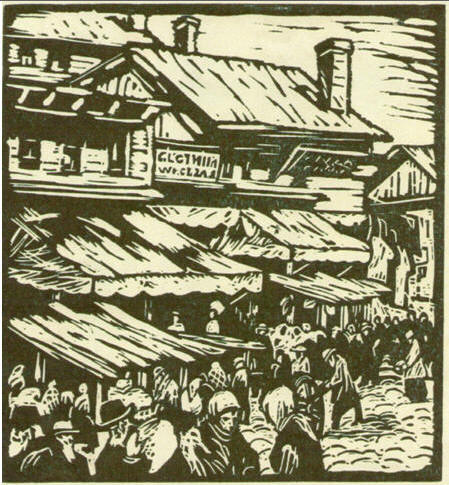 Given
the amount of fine detail that Papa Charlie Jackson offers to the
listener, it would be readily apparent that at some stage he had
indeed been a street vendor of coal; selling it from a horse-drawn
wagon. Also his reference to ‘bituminous coal’ would not be in
generally familiar usage by working class African Americans at the
time and is probably unique in the annals of recorded blues. He
even gives out an address on the Windy City’s famous Maxwell Street
market (alas long demolished) which was a major centre for street
singing blues artists into the early 1970s and ‘80s. Blues was even
heard for the last time (?) on Maxwell at the opening of the 21st.
century according to a report on Wikipedia.
Given
the amount of fine detail that Papa Charlie Jackson offers to the
listener, it would be readily apparent that at some stage he had
indeed been a street vendor of coal; selling it from a horse-drawn
wagon. Also his reference to ‘bituminous coal’ would not be in
generally familiar usage by working class African Americans at the
time and is probably unique in the annals of recorded blues. He
even gives out an address on the Windy City’s famous Maxwell Street
market (alas long demolished) which was a major centre for street
singing blues artists into the early 1970s and ‘80s. Blues was even
heard for the last time (?) on Maxwell at the opening of the 21st.
century according to a report on Wikipedia.
Some
two years previous to his Coal Man Blues, this address
appeared on his Maxwell Street Blues [Paramount 12320] which
might be an actual address or where he intended to make his base for
busking, with his eye on the chance of garnering some more interest
in his playing an singing, and rewarding him accordingly. He was
doing the rounds also on his wagon and ‘pushcart’ at this time
taking in other likely markets as well (selling coal?). But
apparently he’s not just after his daily bread!
| |
There’s Maxwell Street market, South Water Street market, too. (x 2) |
| |
If you ain’t got no money, the women
got nothin’ for you to do. |
| |
|
| |
Lord, I’m talkin’ about the wagon.
Talkin’ about the push-cart, too. (x 2) |
| |
‘Cos the Maxwell Street [market] so crowded on a
Sunday you can hardly [pass through. |
| |
|
| |
I live 624, mama, an’ I’m talkin’
to you; |
| |
I live 624, Maxwell, mama an’ I’m talkin’ to you. |
| |
‘Cos that’s where I go a-walk, doodly-doodly, how
are you? (8) |

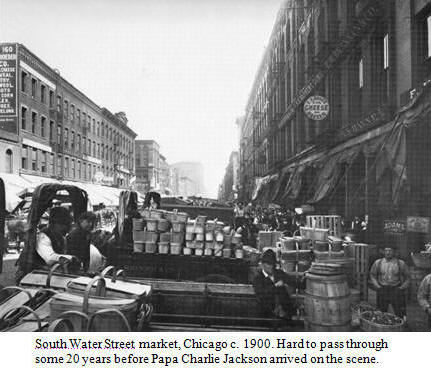
As
already noted Papa Charlie Jackson had recorded with some vaudeville
blue singers including Ma Rainey. There is also a much more
nebulous link between the ‘Mother of the Blues’ (see JSP 7793) and
Bo Weavil Jackson. His very nom-de-plume derives from a 1923
recording she made titled Bo-Weavil
Blues [Paramount 12080] and
was one of her best known songs. As well as including some of the
traditional ‘weevil verses’, Jackson adapts two of Ma Rainey\s own:
Hey, hey bo weevil, don’t sing them
blues no more. (x2)
Bo weevil here, bo weevils
everywhere you go.
I don’t want no man to put no
sugar in my tea. (x 2)
Some of them’s so evil, I’m
afraid they might poison me.(9)
Which Bo Weavil Jackson altered to:
No gypsy woman. No gypsy woman can
fry no meat for me;
Lordy, mama.
No gypsy woman can fry no meat
for me.
I ain’t scared, I’m skittish she
might poison me.
A boll weevil here, a boll weevil
there. Hittin’ farmers everywhere;
The preacher said we got boll
weevils here, boll weevils everywhere.
I get my dream last night it was
all in your flour barrel. (10)
Although the phrase used by Ma Rainey ‘put sugar in my tea’ could be
construed as sexual symbolism on occasion, in this instance it is
far more likely to refer to the all-pervading world of hoodoo. To
‘poison’ somebody in the Deep South during the opening decades of
the 20th. century was to put a spell on them or otherwise
‘fix’ them. Several popular Southern dishes, which included red
beans and rice for example, could include a sample of a woman’s
menstrual blood as part of a mojo hand to ensure her partner does
not stray. Usually by rendering the potentially wayward male as
temporarily impotent, and therefore unable to succumb to the charms
of another woman as his ‘nature was bound to fall’. In Bo Weavil
Jackson’s verse his inclusion of the ‘gypsy woman’ not to fry meat
for him clearly has this danger of being fixed, in mind. Even
though I cannot call to mind the male equivalent in this case!
Although New Orleans and Louisiana generally, are the most
well-known regions in the blues world today; other locations also
had very strong hoodoo reputations. Particularly Beaufort in South
Carolina (home of at least one Dr. Buzzard) and down in Georgia and
Alabama. Tentative stabs at placing Jackson’s home-base have been
stated over the years to be ‘Carolina’ and Mobile or Birmingham in
Alabama. Ma Rainey herself recorded several titles alluding to
superstition and hoodoo from the beginning of her recording career
to the final sessions in 1928. As well as the aforementioned Bo-Weavil
Blues (and its re-make in 1928), these included Lucky Rock
Blues and Toad Frog Blues both from 1924, Louisiana
Hoo-Doo Blues in 1925, plus three from 1928: Black Cat Hoot
Owl Blues , Screech Owl Blues and Black Dust Blues
.
It
was on the streets of Birmingham (‘Magic City’) that Paramount’s
talent scout Harry Charles found Bo Weavil Jackson playing for
nickels and dimes, in the mid-1920s. As indeed, where he found
another rural guitarist Buddy Boy Hawkins who would record in the
following year of 1927. This was during the cross-over from
acoustical to electrical recordings and apparently Charles had
trouble with both these artists in front of the ‘new-fangled’
microphone-both performers “ ‘had difficulty standing still in
front of the microphone ...We had to tie him [Hawkins] up to the
mikes. He walked off. And I put headphones on and it took us all
day to make three or four records’. About Jackson, Charles said,
‘You couldn’t hold him to the mike. He’s be so far from it all the
time’.” (11) The microphone
apparently “ ‘scared a lot of them, even quartets’.” (12)
One of the mainstays of black recordings in Birmingham was the
multitude of excellent a capella quartet groups in the 1920s.
Whichever his place of origin, Bo Weavil Jackson
extended his hoodoo theme on Devil And My Brown Blues [Vocalion
unissued] which was his initial recording for his second and last
session on 30 September, 1926, about a month after his stint for
Paramount; as ‘Sam Butler’. As one of the four major themes in
early blues, hoodoo had evolved from the ancient vodou/voodoo from
West Africa and via Haiti had arrived in the US by 1900. Although
its earlier forms were abundant in the slavery era. One of the main
roles in the African diaspora of gods and spirits was the
trickster. Whilst the crossroads lwa or voodoo spirit Papa Legba
(reappearing as the ‘devil’) and later Brer Rabbit are more familiar
to blues fans, another one who belongs in the same group as Papa
Legba is the spider trickster Ananse/Anansi (both spellings are
used). But although his name is omitted (the Hausa call him Gizo (in this case he survives in the blues more or less as a he was known
to the Ashanti and throughout the Sudanic region in West Africa).
Jackson includes a lyric prevalent in the blues and can be seen as a
floating verse, albeit his answering line (whatever he says at the
beginning of it!) is unique to this singer.
| |
Spider, spider. Spider, spider, crawlin’ on the wall; |
| |
Mm-mmmm. |
| |
Spider, spider. Now, crawlin’ on the wall. |
| |
Cryin’ he’s taxed (?)
but ‘e’s crazy about ‘is alcohol. |
| |
|
| |
I heard a mighty rumblin’ down under the ground; |
| |
Lord, mama. |
| |
Mighty rumblin’ way down
under the ground. |
| |
The boll weevil an’ the devil was stealin’ somebody’s brown. (13) |
Ananse (the Ashanti word) like many gods/demigods
was a shape changer including adopting the form of a bird.
“Ananse is free to modify his own bodily parts and those of others
and to shift them around according to whim and need.”. (14)
So it is an easy interpretation where he transforms into the boll
weevil and meets the Devil down in Hell. Ostensibly to share stolen
sexual pleasures along with the Devil in having their way with a
brownskin woman.
| |
Daddy was low an’ squatty, daddy was [sic] got to
see; |
| |
Lordy, mama. |
| |
Low an’ squatty, daddy was got to see. |
| |
Said he had everythin’
that a poor boll weevil need. (15) |
Ananse “is both fooler and fool, maker and
unmade, wily and stupid, subtle and gross, the High God’s accomplice
and his rival.”. (16)
And “The stories remain bawdy and to everyday sensibilities,
outrageous. Ananse is still a liar and a lecher [while being]
at once creator of order and lawless fool.”. (17)
This High God is Nyame (God of the Sky) and is responsible for
“the creation of human existence [and Ananse] in fact is the agent
of Nyame himself.”. (18)
Yet another blues by Bo Weavil Jackson includes a
reference to a belief in hoodoo which involved the Carolinas. His
first recording of You Can’t Keep No Brown [Paramount 12389]
which is an entirely different song to his Vocalion version, has one
verse running:
| |
I’m gon’ write a letter,
mail it in the air; |
| |
I gon’ write a
letter, gon’ mail it in the air. |
| |
‘Cause [when] the March wind blow, blow news
everywhere. (19) |
Variants of these lines appeared a little later
in blues including those of Garfield Akers and Noah Lewis with
Cannon’s Jug Stompers. Invoking a folk tale from the 1930s, which
described how 2 young black men having no jobs and success at
gambling as a substitute, left their town in North Carolina and
headed south across the State line to the seaport of Beaufort to
visit Dr. Buzzard, an eminent hoodoo doctor. In reply to their
request for a mojo hand to give them a long winning streak at the
gambling tables, Dr. Buzzard said it would cost them $10.00. As the
boys were both broke, he instructed them on how to pay him once they
started accumulating sufficient money. When they could afford the
$10.00 they were to stand and face the rising sun and put the bill
in a sealed envelope. Then they were to throw this up in the air.
After they had done what the hoodoo doctor said, the envelope
immediately disappeared. A few days later the boys heard from Dr.
Buzzard thanking them for the $10.00 payment.
The world of hoodoo crops up in Papa Charlie
Jackson’s very first recording Airy Man Blues [Paramount
12219] in 1924. Part of the refrain runs:
| |
You can get yourself together; |
| |
You can ride with the weather. |
| |
I’m a mean old hairy man. (20) |
This invokes a biblical reference from Genesis,
(xxv.25) where Rebekah (the woman at the well) married Isaac and
gave birth to Esau (the ‘hairy man’) and Jacob. “Rebekah gave
birth to twins. The first born was red and had a hairy body, so
they named him Esau. (The Hebrew word for ‘hairy’ sounds like Seir,
the region of the Edomites, Esau’s descendants.” . (21)
As a young man, and Rebekah’s favourite, “ Jacob said to Rebekah
his mother, Behold, Esau my brother is a hairy man, and I
am a smooth man.”. (xxvii.11)
Esau’s physical appearance may have inspired the
following folk tale collected by the WPA Writers’ Project in 1941.
Coming from the shores of the Tombigbee River in Alabama, this is
titled ‘Wiley and the Hairy Man’. “Wiley’s pappy was a bad man
and no-count. He stole watermelons in the dark of the moon, slept
while the weeds grew higher than the cotton, robbed a corpse laid
out for burying, and worst than that, killed three martins and never
even chunked at a crow [i.e. threw a stone to scare the crow off
the field] So everybody thought that when Wiley’s pappy died he’d
never cross Jordan because the Hairy Man would be there waiting for
him. That must have been the way it happened, because they never
found him after he fell off the ferry boat at Holly’s where the
river is quicker than anywhere else…And they heard a big man
laughing across the river and everybody said, ‘That’s the Hairy
Man’. So they stopped looking.”.
(22)
Wiley was warned by his ‘mammy’ that the Hairy
Man would soon come after him, too. She was “from the swamps by
the Tombigbee and knew conjure.” (23)
This Hairy Man was a shape-changer and he was
“hairy all over. His eyes burned like fire and spit drooled all
over his big teeth.”. (24)
He also had feet like a cow. After Wiley and his mother (with her
conjure powers) were successful in fooling the Hairy Man on two
occasions, they managed to defeat him for good at the third
attempt. Wiley’s mother told him “ ‘That old Hairy Man c’ain’t
ever hurt you again. We done fooled him three times.’ Wiley went
over to the safe and got out his pappy’s jug of shinny
[moonshine] that had been lying there since the old man fell in
the river. ‘Mammy’, he said. ‘I’m goin’ to get hog-drunk and
chicken wild’. ‘You ain’t the only one chile. Ain’t it nice yo’
pappy was so no-count he had to keep shinny in the house?’”
(25)
Another Ma Rainey ‘link’ with Bo Weavil Jackson
occurs in some of the lyrics from her Cell Bound Blues
[Paramount12257] in 1924, and which featured in Jackson’s You
Can’t Keep No Brown [Vocalion unissued] some two years later.
Ma Rainey sang:
| |
I’ve got a mother an’ father lives in a
cottage by the sea; |
| |
Got a mother an’ father livin’ in a cottage by the sea, |
| |
Got a sister an’ brother, wonder do they think of
poor me. (26) |
Sandra Lieb, author of the definitive book on Ma
Rainey, observed that the cottage reference “seems archaic and
outside the blues idiom” .(27)
Yet a dip into Partridge’s dictionary of underworld slang might
suggest otherwise. Although no entry for ‘cottage’, the heading
‘shack’ runs: “ ‘a hut, a very small and humble cottage built of
wood.” (28)
Although probably unique in the Blues via Ma Rainey’s verse, a jazz
standard springs to mind called Cottage For Sale, a Willard
Robison song from 1930 with lyrics by Larry Conley was published.
This had over 100 versions including those by Jack Teagarden, Nat
King Cole, Peggy Lee, Julie London as well as Robison’s original in
1930. Even appearing in the worlds of r ‘n b and rock ‘n roll by
singers such as Charles Brown, Little Willie John, and Chuck
Berry. It is possible Robison was familiar with Rainey’s song.
However widespread in North America, the word ‘cottage’ was replaced
in 1926 by Bo Weavil Jackson. Otherwise his verse runs along
identical lines to Ma Rainey’s:
| |
I got
a mother an’ father, live close to the sea; |
| |
Got a mother an’ father, live close to the sea. |
| |
Got a brother an’ a sister, wonder do they think
of poor me. (29) |
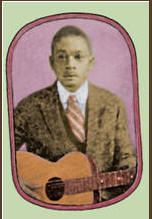 It’s
tantalizing to think he was referring to actual siblings and
possibly younger ones at that. However, this verse (in 2014) is like
a flicker of a dying candle in the dark mystery cloud which
surrounds personal details of James ‘Bo Weavil’ Jackson.
It’s
tantalizing to think he was referring to actual siblings and
possibly younger ones at that. However, this verse (in 2014) is like
a flicker of a dying candle in the dark mystery cloud which
surrounds personal details of James ‘Bo Weavil’ Jackson.
Papa Charlie Jackson had arrived on an I.C. train
from his native New Orleans around the beginning of the 1920s. But
he was not the first in the Windy City. Alberta Hunter (see
Vaudeville Blues. Ibid) was there earlier but by the time
Jackson was getting off his train she had moved east to New York
City where by 1923 some of her most popular contemporaries like
Clara Smith resided.
Like many early rural singers, Bo Weavil Jackson
had a great respect for the vaudeville blues singers who had
preceded him into the recording studios. (Vaudeville Blues.
Ibid.) This would include Papa Charlie who was after all
mainly seen as drawing on the vaudeville and minstrelsy traditions.
Ethel Waters and Clara Smith were just 2 who cut versions of his
repertoire. Another was Sara Martin who had started making records
in 1922. In November 1923, she cut Roamin’ Blues [OKeh 8104]
with just Sylvester Weaver on guitar. One verse ran:
| |
Some would scream ‘high
yellows’, some screamin’ ‘my brown an’ black’; |
| |
Some would’ve scream ‘high yellows’, but give me
my brown an’ black. |
| |
I say, the only colored man that I really like. (30) |
Thus contributing to the socially damaging caste
system so prevalent in the black community which was reflected in
the Blues at the time.
[Footnote 2: See Meaning In The Blues
(p.p.25- 30.Notes. JSP 77141. 4-CDs + 80 page
booklet). On one of the earliest titles, in the spring of 1922, by the
Excelsior Quartette included the line ‘My honey, ain’t you glad
you’re brownskin, chocolate to
the bone’; which 12-string guitarist Barbecue
Bob recorded as Chocolate To The Bone in 1928.]
Some 9 months later in 1924, Papa Charlie Jackson included a rare
ambivalence to this caste system on his first record. As he sang on
Papa\s Lawdy Lawdy Blues [Paramount 12219]:
| |
I ain’t crazy about
no yellers, I ain’t no fool about no brown; |
| |
‘Cos you can’t tell the difference, mama, when
the sun goes down. (31) |
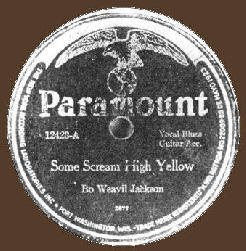 In
1926, Bo Weavil Jackson used Sara Martin’s verse and part of it
became his title-Some Scream High Yellow [Paramount12423].
In April the following year Sara Martin re-made her recording, again
with Sylvester Weaver, as Gonna Ramble Blues. A couple of
months later Clara Smith-Queen of the Moaners-adapted Martin’s lines
for her own individual blues which she introduced with a rare spoken
comment.
In
1926, Bo Weavil Jackson used Sara Martin’s verse and part of it
became his title-Some Scream High Yellow [Paramount12423].
In April the following year Sara Martin re-made her recording, again
with Sylvester Weaver, as Gonna Ramble Blues. A couple of
months later Clara Smith-Queen of the Moaners-adapted Martin’s lines
for her own individual blues which she introduced with a rare spoken
comment.
(Spoken) Some of ya runs around
here. An’ talks about the good-lookin’ high yallers.
An’ some of you raves
about the sealskin browns. Huh! I’m gonna tell you
about these good-lookin’
women, now. (32)
Whereas Clara Smith used part of a jazz outfit
for her musical accompaniment, Sara Martin’s disc was one of the
first vocal and guitar recordings. Although it was Bo Weavil
Jackson’s much harder approach which illustrated the early rural
blues so admirably, featuring something of the Mississippi Delta
sound.
| |
Some screamin’ ‘high yaller’
I screams ‘[I] like a brown’; |
| |
Some scream ‘high yaller’, scream ‘like a brown’. |
| |
A yellow may mistreat you but a black won’t turn
you down. (33) |
Jackson also employed the moan a la Clara Smith
after another verse which was picked up by rock ‘n roll star Chuck Berry some 32 years
later on his Reelin’ And Rockin’.
| |
Sometime I think I will. Then I think that I
won’t. (x2) |
| |
Sometime I think I do so, then I think that I
don’t. |
| |
Mmmmmm-mmmm. Mmmmmmm-mmmm. (x 2) |
| |
Sometime I think I will, an’ then I think that I
won’t. (34) |
The Clara Smith influence is even stronger on
Jackson’s Why Do You Moan? [Paramount 12423], which was his
‘cover’ of Clara’s Awful Moanin’ Blues from 1923.
The main influential two-way stream seems to be
three major vaudeville blues singers-Clara Smith, Ma Rainey and Sara
Martin- and both Jackson’s involvement with hoodoo. Of course these
factors are not peculiar to these singers. Both Charlie Patton and
Charley Lincoln recorded Rainey songs and Bessie Smith along with Ma
Rainey did sides by Papa Charlie Jackson. The latter was originally
from New Orleans and Bo Weavil Jackson has often been cited as from
‘Carolina’. Along with the South Carolina Sea Islands, these
locations were known to feature (and probably still do) some of the
strongest hoodoo traditions in the US. Baby, why do you moan, when
you can shake that thing?
Max Haymes
|
Notes |
|
| |
|
|
1. Smith Chris |
Notes to Papa Charlie
Jackson Vol.1 1924-1926 |
| |
Document CD. [DOCD-5087] 1991. |
|
2. Smith C. |
p.301. |
|
3. Kent Don |
Notes to Times Ain’t
Like They Used To Be- Vol.7. |
| |
[Yazoo CD YA 2067] 2003. |
|
4. Swinton P. |
p.45. |
| |
|
|
5. ‘Look Out Papa Don’t Tear Your Pants’ |
Papa Charlie Jackson vo. bjo., speech.
c. October 1927. Chicago, Illinois. |
|
6. ‘Coal Man Blues’ |
Papa Charlie Jackson vo. bjo.; unk. bjo., speech. |
| |
c. May 1927. Chicago, Illinois. |
|
7. Ibid. |
|
|
8. ‘Maxwell Street Blues’ |
Papa Charlie Jackson vo.bjo.
c. September 1925. Chicago, Illinois |
|
9. ‘Bo-Weavil Blues’ |
Madame ‘Ma’ Rainey acc. by Lovie Austin & Her |
| |
Blues Serenaders: Ma Rainey vo.;
Tommy Ladnier |
| |
cnt.;
Jimmy O’Bryant clt.; Lovie Austin pno. |
| |
December 1923. Chicago, Illinois. |
|
10. ‘Devil And My Brown Blues’ |
Bo Weavil
Jackson vo.gtr.
Thursday, 30th. September 1926. New York City. |
| |
|
|
11. Tuuk van der A. |
p.119. |
|
12. Ibid. |
|
|
13. ‘Devil And My Brown Blues’ |
Ibid. |
|
14. Pelton R.D. |
p. 35. |
|
15. ‘Devil And My Brown Blues’ |
Ibid. |
|
16. Pelton |
Ibid. p.p.27-28. |
|
17. Ibid. |
p.37. |
|
18. Ibid. |
p.47. |
19. ‘You Can’t Keep No Brown
(Paramount) |
Bo Weavil
Jackson vo.gtr.
c. August, 1926. Chicago, Illinois.. |
|
20. ‘Airy Man Blues’ |
Papa Charlie Jackson vo.bjo. |
| |
c. August 1924. Chicago, Illinois. |
|
21. Baldock J.
|
p.34.
|
|
22. Botkin B.A. |
p.682. |
|
23. Ibid. |
|
|
24. Ibid. |
p.683. |
|
25. Ibid. |
p.p.686-687. |
|
26. ‘Cell Bound Blues’ |
Ma Rainey acc. Her Georgia Jazz Band: Tommy Ladnier
cnt.; |
| |
Jimmy O’Bryant clt.; Lovie Austin pno. |
| |
c.
November 1924. Chicago, Illinois. |
|
27. Lieb S. |
p.119. |
|
28. Partridge E. |
p.610. |
|
29. ‘You Can’t keep No Brown’ (Vocalion) |
Bo Weavil
Jackson vo.gtr. (as ‘Sam Butler’)
Thursday, 30th. September 1926. New York City |
|
30. ‘Roamin’ Blues’ |
Sara Martin vo. Sylvester Weaver gtr. |
| |
Friday, 2nd. November 1923. New York City. |
|
31. ‘Papa’s Lawdy Lawdy Blues’ |
Papa Charlie Jackson vo.bjo. |
| |
c. August 1924. Chicago, Illinois. |
|
32. ‘Black Woman’s Blues’ |
Clara Smith vo., speech; Bob Fuller alto.; Porter
Grainger pno. |
| |
Wednesday, 1st. June 1927. New York City. |
|
33. ‘Some Scream High Yellow’ |
Bo Weavil
Jackson vo.gtr. |
| |
c. August 1926. Chicago, Illinois. |
|
34. Ibid. |
|
|
Bibliography |
|
| |
|
|
1. Baldock John
|
Women In The Bible(Miracle Births, Heroic Deeds,
Bloodlust And Jealousy)
|
| |
[Capella. London] 2006. |
|
2. Botkin B.A. (Ed.) |
A Treasury Of American Folklore |
| |
[Crown Publishers. New York] 1944. |
|
3. Lieb Sandra |
Mother Of The Blues (A Study Of Ma Rainey) |
| |
[The University Of Massachusetts Press.
Amherst] 1981 |
|
4. Partridge Eric |
A Dictionary Of The
Underworld |
| |
[Wordsworth Editions. Ware, Hertfordshire] 1989
Rep. 1st.
pub. 1950. |
|
5. Pelton Robert D.
|
The Trickster In West Africa (A Study of Mythic
|
| |
Irony And Sacred Delight) |
| |
[University of California Press. Berkeley.
Los
Angeles. London] 1980. |
|
6. Smith Chris. Tony Russell. |
The
Penguin Guide To Blues Recordings. |
| |
[Penguin Books. London] 2006. |
|
7. Swinton Paul |
The Frog Blues & Jazz Annual No.2. |
| |
[Frog Records Limited. Fleet, Hampshire] 2011. |
|
8. Tuuk van der Alex |
Paramount’s Rise And Fall( A History 0f The |
| |
Wisconsin Chair Company And Its Recording Activities) |
| |
[
Mainspring Press. Denver, Colorado] 2003. |
Discographical details from Blues & Gospel
Records 1890-1943. Robert M.W.Dixon. John Godrich. Howard Rye.
[Clarendon Press. Oxford] 1997.
All corrections/additions by Max Haymes.
Transcriptions by Max Haymes.
20th. March 2014.